
Grain freighter loading at the Port of Portland's Terminal 5.
Michael Clapp / OPB
A new report released by the Pacific Northwest Waterways Association (PNWA) studied the effect of deepening the Columbia River shipping channel by three feet — from 40 feet to 43 feet — since the project was completed in 2010. PNWA says the cost of the dredging was about $183 million (with an ongoing yearly cost of $35 million) but the economic benefit amounts to more than $1 billion.
The group's executive director Kristen Meira says the study found that investments resulting from the deepening have been replicated all across the river system — one of the biggest being an expanded grain terminal in Longview, Washington.
Meira says, "We have 46 millions tons of cargo as of 2012. That's about 10 or 11 million tons more than just 10 years before. But actually the ship calls are decreasing, we're seeing larger ships calling on our system, and they're able to load more fully, so it's a more efficient way of doing business."
Port of Portland executive director Bill Wyatt also lauded the report. He says he's optimistic about the future, even as the region struggles with the departure of Hanjin, out of Terminal 6 — after an extended labor dispute.
"Terminal 6 represents 30 percent of the Longshore hours in the Portland harbor," Wyatt says, "There isn't enough work available for the people who want it. And so [at] Local 8, the hours are down significantly."
But, Wyatt says, Hanjin's departure has an upside — in that the absence of a major carrier highlighted the value of that service, because people who have goods to transport abroad have had to pay increased costs to get the cargo to another port. He says he's convinced that those farmers, manufactures and other businesses will be willing to pay more to ship from the Port of Portland.
"The reality is there isn't enough trucks, there isn't enough capacity to handle all the cargo that was in the water here in Portland. And for peas, lentils and beans and hazelnuts and cargos of that sort, which are actually very heavy, you have to have a special, heavy duty chassis ... and they're even more expensive."
Now that a new labor contract has been ratified, Wyatt is hopeful the a new carrier will be attracted to the Port sooner rather than later.
